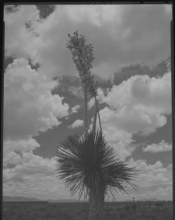Article
A native plant to the U.S. Southwestern regions, the yucca is a member of the agave family, characterized by stiff, sword-like leaves. In the center of the yucca plant grow its long spikes that carry clusters of white, bell-shaped flowers. There are over forty species of yucca, and the indigenous peoples of the Southwest have a long history of utilizing the plant's thick, strong fibers in woven textiles and cords. Although woven yucca textiles are no longer in use, the cords remain vital elements in rituals. The Zuni people, for example, use these cords to tie prayer plumes and wands. The pulp and sap of the plant can also be used as a soap, especially for hair washing.
The yucca flower is the state flower of New Mexico.
"Black-and-white photograph of a flowering yucca in Southwestern New Mexico," photograph, Palace of the Governors Photo Archives Collection ( HP.2007.20.256). Palace of the Governors Photo Archvies, New Mexico History Museum, Santa Fe.
Manuscripts
References
Bonvillain, Nancy
2004 The Zunis and the Raw People. Zuni, Indians of North America, Heritage Edition.
Philadelphia:Chelsea House Publishers.
Encyclopædia Britannica Online
N.d. yucca. http://www.britannica.com/EBchecked/topic/654572/yucca, accessed
November 24, 2014.
Keoke, Emory Dean, and Kay Marie Porterfield
2001 Sandals, American Indian. Encyclopedia of American Indian Contributions to the
World: 15,000 Years of Inventions and Innovations. New York: Facts On File, Inc.

